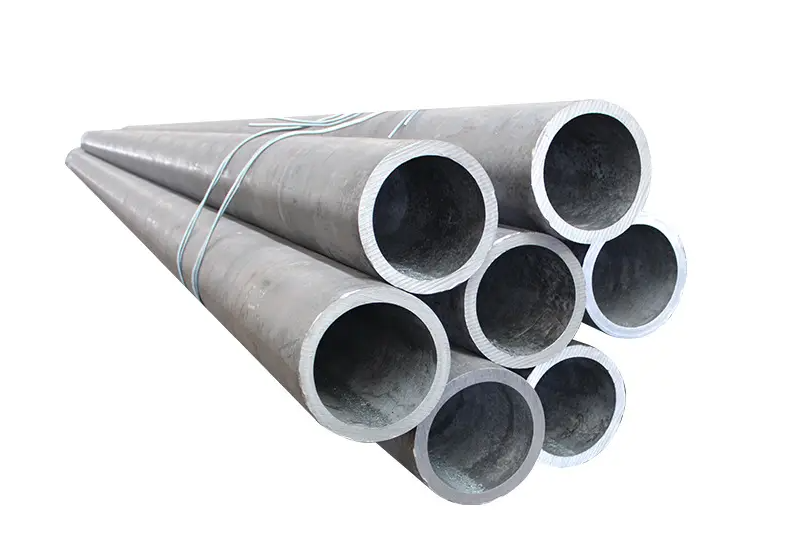Tubería de acero aleado ASTM A369

Tubería de acero aleado ASTM A369
Introducción
ASTM A369 is a standard specification for heavy-wall carbon and alloy steel pipe made from forged and bored billets. These pipes are designed for high-temperature and high-pressure applications, often used in boiler and pressure vessel construction. ASTM A369 pipes are ideal for environments where high strength and durability are essential.
Grados clave y composición química
ASTM A369 includes several grades, primarily classified into carbon steel and alloy steel. Here are some common grades:
- Grados de acero al carbono: FP1, FP2
- Grados de acero de aleación: FP11, FP12, FP22, FP91
Composición química
Below are the chemical compositions for select ASTM A369 grades.
Grados de acero al carbono
Grade FP1
- Carbón (c): 0.10 – 0.20%
- Manganeso (Minnesota): 0.30 – 0.80%
- Fósforo (PAG): ≤ 0.035%
- Azufre (S): ≤ 0.035%
- Silicio (Y): 0.10 – 0.50%
Grade FP2
- Carbón (c): 0.10 – 0.20%
- Manganeso (Minnesota): 0.30 – 0.80%
- Fósforo (PAG): ≤ 0.035%
- Azufre (S): ≤ 0.035%
- Silicio (Y): 0.10 – 0.50%
Grados de acero de aleación
Grade FP11
- Carbón (c): 0.05 – 0.15%
- Manganeso (Minnesota): 0.30 – 0.60%
- Fósforo (PAG): ≤ 0.030%
- Azufre (S): ≤ 0.030%
- Silicio (Y): 0.50 – 1.00%
- Cromo (cr): 1.00 – 1.50%
- Molibdeno (Mes): 0.44 – 0.65%
Grade FP91
- Carbón (c): 0.08 – 0.12%
- Manganeso (Minnesota): 0.30 – 0.60%
- Fósforo (PAG): ≤ 0.020%
- Azufre (S): ≤ 0.010%
- Silicio (Y): 0.20 – 0.50%
- Cromo (cr): 8.00 – 9.50%
- Molibdeno (Mes): 0.85 – 1.05%
- Vanadio (V): 0.18 – 0.25%
- Nitrógeno (norte): 0.03 – 0.07%
- Niobio (Nótese bien): 0.06 – 0.10%
Propiedades mecánicas
The mechanical properties of ASTM A369 pipes depend on the grade and heat treatment applied. A continuación se muestran propiedades típicas de algunos grados comunes.:
Grados de acero al carbono
Grade FP1
- Resistencia a la tracción: ≥ 415 MPa (60,000 psi)
- Fuerza de producción: ≥ 205 MPa (30,000 psi)
- Alargamiento: ≥ 30%
Grade FP2
- Resistencia a la tracción: ≥ 415 MPa (60,000 psi)
- Fuerza de producción: ≥ 205 MPa (30,000 psi)
- Alargamiento: ≥ 30%
Grados de acero de aleación
Grade FP11
- Resistencia a la tracción: ≥ 415 MPa (60,000 psi)
- Fuerza de producción: ≥ 205 MPa (30,000 psi)
- Alargamiento: ≥ 30%
Grade FP91
- Resistencia a la tracción: ≥ 585 MPa (85,000 psi)
- Fuerza de producción: ≥ 415 MPa (60,000 psi)
- Alargamiento: ≥ 20%
Propiedades químicas
| Calificación | Carbón | Manganeso | Fósforo | Sulphur | Silicio | Cromo | Molibdeno | Others |
|---|---|---|---|---|---|---|---|---|
| FPA | 0.25 máximo | 0.27 – 0.93 | 0.035 máximo | 0.035 máximo | 0.10 mín. | … | … | … |
| FPB | 0.30 máximo | 0.29 – 1.06 | 0.035 máximo | 0.035 máximo | 0.10 mín. | … | … | … |
| FP1 | 0.10 – 0.20 | 0.30 – 0.80 | 0.025 máximo | 0.025 máximo | 0.10 – 0.50 | … | 0.44 – 0.65 | … |
| FP5 | 0.15 máximo | 0.30 – 0.60 | 0.025 | 0.025 | 0.50 máximo | 4.00 – 6.00 | 0.45 – 0.65 | … |
| FP9 | 0.15 máximo | 0.30 – 0.60 | 0.030 | 0.030 | 0.50 – 1.00 | 8.00 – 10.00 | 0.90 – 1.10 | … |
| FP11 | 0.05 – 0.15 | 0.30 – 0.60 | 0.025 | 0.025 | 0.50 – 1.00 | 1.00 – 1.50 | 0.44 – 0.65 | … |
| FP21 | 0.05 – 0.15 | 0.30 – 0.60 | 0.025 | 0.025 | 0.50 máximo | 2.65 – 3.35 | 0.80 – 1.06 | … |
| FP22 | 0.05 – 0.15 | 0.30 – 0.60 | 0.025 | 0.025 | 0.50 máximo | 1.90 – 2.60 | 0.87 – 1.13 | … |
| FP91 | 0.06 – 0.12 | 0.30 – 0.60 | 0.025 | 0.025 | 0.20 – 0.50 | 8.00 – 9.50 | 0.85 – 1.05 | En 0.40 máximo V 0.18–0.25 Cb 0.06–0.10 N 0.03–0.07 Alabama 0.02 máximo De 0.01 máximo Zr 0.01 máximo |
| FP92 | 0.07 – 0.13 | 0.30 – 0.60 | 0.020 | 0.010 | 0.50 máximo | 8.50 – 9.50 | 0.30 – 0.60 | W 1.50–2.00 V 0.15–0.25 Cb 0.04–0.09 N 0.030–0.070 En 0.40 máximo Alabama 0.02 máximo De 0.01 máximo Zr 0.01 máximo B 0.001–0.006 |
Propiedades mecánicas
| Calificación | Resistencia a la tracción, ksi [MPa] | Fuerza de producción, ksi [MPa] |
|---|---|---|
| FPA | 48 [330] | 30 [210] |
| FPB | 60 [415] | 35 [240] |
| FP1,FP2 | 55 [380] | 30 [210] |
| FP12 | 60 [415] | 32 [220] |
| FP91 | 85 [585] | 60 [415] |
| FP92 | 90 [620] | 64 [440] |
| All Others | 60 [415] | 30 [210] |
Proceso de fabricación
Forging and Boring
ASTM A369 pipes are manufactured from forged and bored billets, which involve the following steps:
- Calefacción de palanquilla: The steel billet is heated to a high temperature to become malleable.
- Forja: The heated billet is forged to form a rough pipe shape.
- Aburrido: The forged pipe is bored to achieve the required internal diameter.
- Mecanizado: The pipe is machined to meet precise dimensions and surface finish requirements.
Tratamiento térmico
El tratamiento térmico es crucial para lograr las propiedades mecánicas requeridas.:
- Recocido: Calentar la tubería a una temperatura alta seguida de enfriamiento lento para suavizar el material.
- Normalizando: Calentar la tubería a una temperatura específica y luego enfriar el aire para refinar la estructura de grano.
- Temple y revenido: Calentamiento seguido de enfriamiento rápido. (temple) y recalentar a una temperatura más baja (templado) para mejorar la dureza.
Requisitos de prueba
ASTM A369 specifies several tests to ensure pipe quality and performance:
- Prueba de tracción: Mide la resistencia a la tracción, límite elástico, y elongación.
- Prueba de dureza: Garantiza que el material cumpla con los niveles de dureza especificados..
- Prueba hidrostática: Garantiza que la tubería pueda soportar la presión interna sin fugas..
- Inspección dimensional: Garantiza que las tuberías cumplan con las dimensiones y tolerancias especificadas..
Aplicaciones
ASTM A369 pipes are used in high-temperature and high-pressure environments, incluido:
- Generación de energía: Boiler and superheater tubes in power plants.
- Industria petroquímica: High-pressure piping systems.
- refinerías: Process piping in high-temperature environments.
- Pressure Vessels: Components requiring high strength and durability.
Ventajas y limitaciones
Ventajas
- Rendimiento a alta temperatura: Adecuado para aplicaciones que involucran altas temperaturas..
- Fortaleza: Alta resistencia mecánica adecuada para aplicaciones exigentes.
- Durabilidad: Manufactured to withstand high pressure and stress.
- Precisión: Forging and boring processes ensure precise dimensions.
Limitaciones
- Costo: Higher cost compared to welded pipes due to the forging process.
- Fabricación compleja: Requiere un control preciso sobre la composición química y el tratamiento térmico..
- Disponibilidad: Los grados y tamaños específicos pueden tener plazos de entrega más largos..
Conclusión
ASTM A369 heavy-wall alloy steel pipes are essential for applications requiring high strength, durabilidad, y estabilidad a altas temperaturas. Sus propiedades mecánicas superiores, combinado con rigurosos procesos de fabricación y pruebas., garantizar que cumplan con los exigentes requisitos de diversas industrias. Comprender las especificaciones detalladas, calificaciones, and applications of ASTM A369 pipes helps engineers and designers select the right materials for their projects, garantizar la seguridad y la eficiencia en entornos desafiantes.







